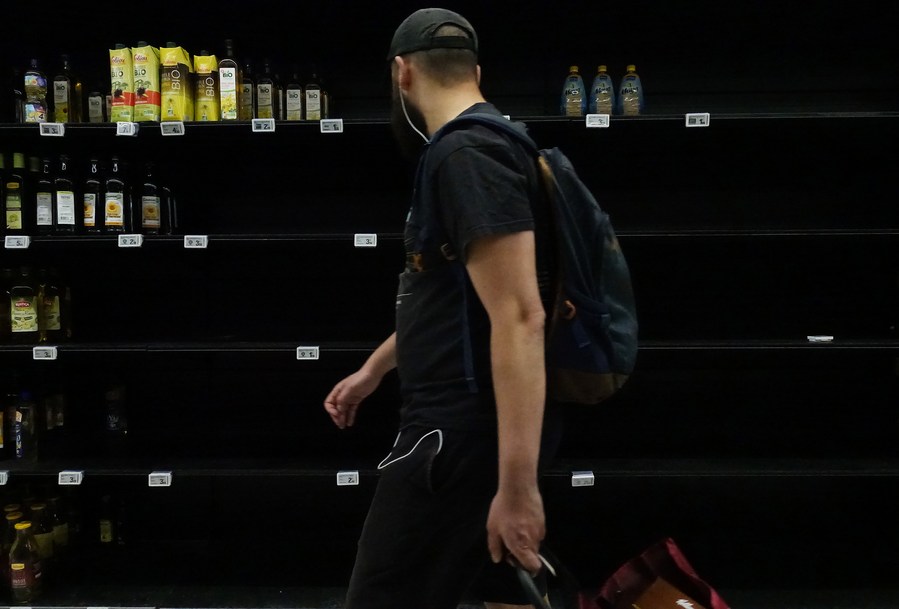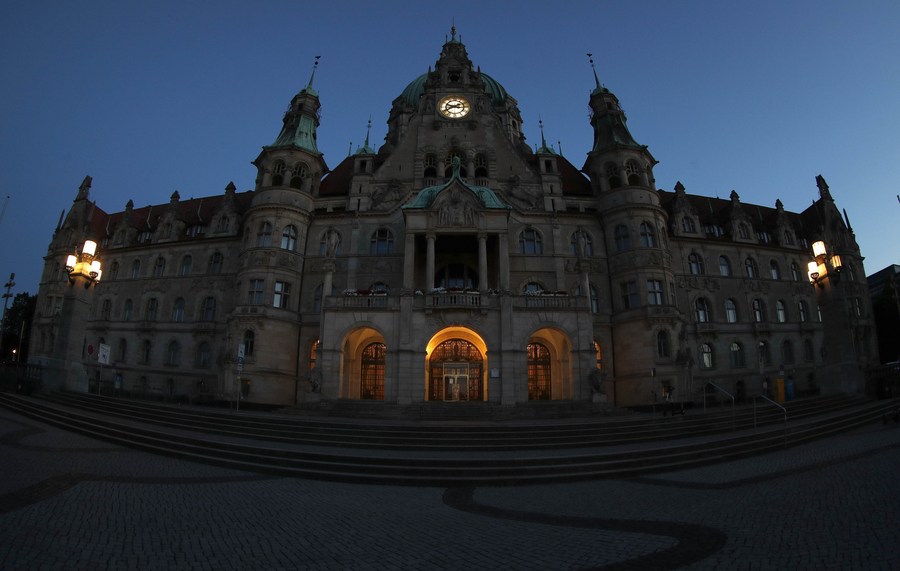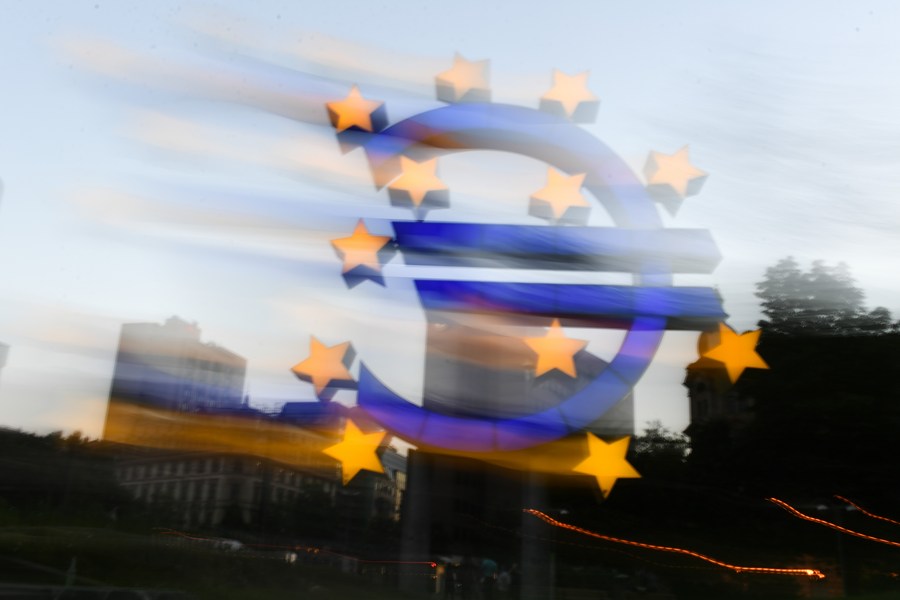EU's economic outlook dimmed by inflation, energy crisis
* Inflation and the months-long energy crisis across Europe has darkening economic prospect and denting residents' confidence in consumption.
* The European Union encourages its member states to save energy consumption and improve energy efficiency, a move whose efficacy is in doubt.
* Analysts said that the growth of European economy in the second quarter may be the last upbeat mood for a recession due in the second half of the year as the economic reset effect gradually weakens.
BRUSSELS, Aug. 16 (Xinhua) -- Inflation across Europe has hit another record high and the months-long energy crisis shows no sign of abating, but weakening consumption and darkening economic prospect.
The European Union's (EU) has asked its member states to cut energy demand, a move whose efficacy is in doubt. The bloc's economic outlook, plagued by surging inflation and energy crisis, has become increasingly grim with lingering risks of recession.
The ramifications of the surge in energy prices are seen everywhere in Europe, due to several negative factors, including the fallout of massive sanctions on Russia and the spillover of the United States' aggressive interest rate hikes.
INFLATION UP, CONSUMPTION DOWN
European residents now have to face soaring cost of living and declining real purchasing power, which have dented their confidence in consumption.
At the same time, the surge in energy cost has also led to a drop in industrial output and the shutdown of some energy-intensive companies, leaving more adverse effects on the European economy.

A customer walks past empty shelves of cooking oil at a supermarket in Paris, France, March 26, 2022. (Xinhua/Gao Jing)
In June, sales fell by 1.2 percent month-on-month, or by 3.7 percent year-on-year, in the euro area, according to fresh estimates from Europe's statistics office Eurostat.
While in the EU, volume of retail trade in June shrank by 1.3 percent compared with that in May, or by 2.8 percent compared with June 2021.
The costs jumped at a time when retail sales fell.
In June, industrial producer prices in the euro area rose by 1.1 percent from May, and jumped by 35.8 percent compared with June 2021, Eurostat reported.
The EU saw the industrial producer prices rise by 1.3 percent from May to June, or a yearly increase of 36.1 percent from June last year, Eurostat said.
Transportation and other costs transmit more upward pressure on consumers, bringing more downward pressure on demand.
"With PMIs (purchasing managers' indexes) indicating that services consumption is now also weakening in the eurozone as reopening effects are fading, and a surge in tourism is about to end, it is likely that consumption will contract in the coming quarters. That would result in a mild recession in the eurozone," Bert Colijn, a senior economist for the eurozone at the global financial institution ING, wrote in an analysis.
"The sharp fall in euro-zone retail sales in June means sales contracted in Q2 as a whole," the Business Times quoted Michael Tran, an assistant economist at the London-based consultancy Capital Economics, as saying.
"With the final PMI surveys pointing to price pressures continuing to intensify and demand softening, we think household spending will struggle over the coming months," he said.
DOUBTS REMAIN
To ensure the energy supply in the approaching winter, the EU encourages its member states to save energy consumption and improve energy efficiency. An agreement by EU member states to cut gas demand this winter by 15 percent came into effect this month. However, questions remain on whether the agreement will ultimately work.

Photo taken on Aug. 1, 2022 shows a night view of the city hall in Hanover, Germany. Some landmark structures across the country have reduced their night illumination to save electricity. (Photo by Joachim Sielski/Xinhua)
On the one hand, due to the uneven gas storage capacity and distribution ability among EU member states, differences on the agreement remain within the EU.
Hungary, for example, questioned the legitimacy of EU rules that affect a country's national energy mix or energy security. Poland described the legal basis for the deal as "defective," saying that decisions affecting the energy mix of EU member states should be taken with unanimous approval from all countries.
On the other hand, analysts pointed out that the agreement itself was full of compromises and doubted whether the 15-percent gas saving target would even ensure a cozy winter in Europe.
Nathan Piper, an oil and gas analyst for Investec, an international banking group, said there is a "high political and economic price" as the EU looks to reduce its dependence on the Russian gas, and that price was being reflected in the exemptions for its members, which would likely reduce the impact of the measures.

Photo taken on June 28, 2022 shows the site of the Midia natural gas development project in Vadu village on the Black Sea coast in southeastern Romania. (Photo by Cristian Cristel/Xinhua)
The EU's coal ban on Russia came into effect on Aug. 11, and the oil ban will take effect in December. During the four-month transition, the EU strengthened coal imports from such countries as the United States, Australia, South Africa and Indonesia. The potential alternatives have led to higher costs, particular when electricity consumption stays high in Europe's summer that happens to run into historic heatwaves this year.
Germany, Italy, Austria, the Netherlands and Denmark have all announced plans to restart coal power projects.
"Europe remains dependent on two things: how cold the winter will be and how Russian flows will evolve into spring. Uncertainty on both will likely keep prices supported even if inventories keep rising over the coming months," said Giovanni Staunovo, an analyst at UBS Global Wealth Management.
GLOOMY ECONOMIC OUTLOOK
Although the European economy grew in the second quarter, analysts said that this may be the last upbeat mood for a recession due in the second half of the year as the economic reset effect gradually weakens.

Photo taken on June 1, 2022 shows the Euro sculpture in Frankfurt, Germany. (Xinhua/Lu Yang)
The Organization for Economic Cooperation and Development (OECD) said in its latest release of Composite Leading Indicators (CLIs) that "dragged down by historically high inflation, low consumer confidence and declining share price indices, the CLIs remain below trend and continue to anticipate a loss of growth momentum in most large OECD economies."
The CLIs, designed to anticipate turning points in economic activity over the next six to nine months, continue to "point to a deteriorating outlook in most major economies," said the report.
"This is the case for Canada, the United Kingdom and the United States, as well as in the euro area as a whole including France, Germany and Italy," it said.
Germany's economy stagnated in the second quarter of this year as the gross domestic product (GDP) was unchanged at 0.0 percent compared to the previous quarter, the Federal Statistical Office (Destatis) said.
"A good decade has ended for Germany -- from here on, we'll be struggling quite a bit for quite some time," Bloomberg quoted Dekabank's industrial economic analyst Andreas Scheuerle as saying.
Scheuerle predicted a winter recession for Germany. "Germany is Europe's problem child in many respects," he said. "Nowhere else are supply shortages hurting the economy more, the shortage of skilled workers has increased, and then of course there's our extremely high dependence on Russian gas."
"It's clear that persistent supply chain disruption, rising energy prices and record-breaking levels of inflation will have a longer-term impact," Rachel Barton, Europe strategy lead for Accenture, told the CNBC.
According to a survey released by the Oxford Economics on Aug. 12, respondents see almost a 60 percent chance of the eurozone following the United States into technical recession in the next 12 months.
"The impetus to growth in H2 2022 looks to be weakening as high and broad inflation, energy-saving measures and tightening financial conditions increasingly weigh on activity," the institute said in a note.
For European bankers, it appears to be a dilemma in regard to interest rates. "The very gradual and cautious normalization process the ECB (European Central Bank) started at the end of last year has simply been too slow and too late," said Carsten Brzeski, global head of macro at ING Germany.
Photos
Related Stories
- EU economy grows for second quarter, recession fears linger
- Australia digs a hole for EU, Asian allies with possible LNG move
- Ukraine gets 500-mln-euro financial aid from EU: PM
- Austrian Chancellor says EU embargo on Russian gas "impossible"
- EU court confirms broadcasting ban on Russia
- EU member states agree to cut off 15 pct of their gas demand
- EU's return to coal shows double standard on carbon reduction
- EU imposes more sanctions on Russia
- EU agrees additional 500 mln euros in military aid for Ukraine
- Ukrainian FM welcomes new 500-mln-euro military aid from EU
Copyright © 2022 People's Daily Online. All Rights Reserved.









